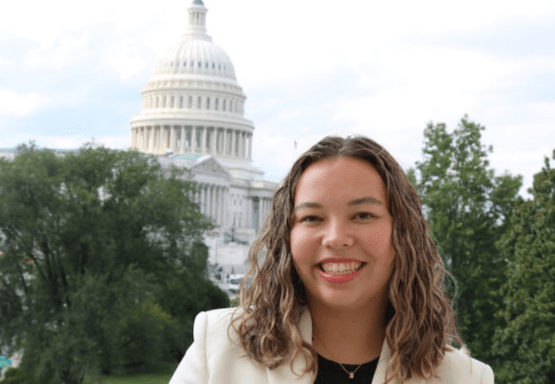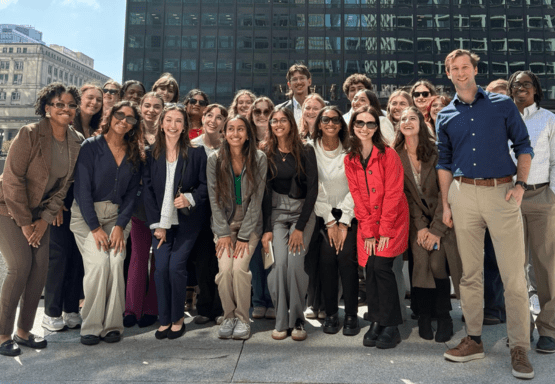Alumna spotlight: Megan Threats

Approximately one-third of James Madison College students continue their education within six months of completing their undergraduate degrees. More than half pursue a degree in law.
JMC Alumna Megan Threats (PTCD & CCP ’11) planned to do the same.
A Gates Millennium Scholar from Grand Rapids’ Creston High School, Threats stood out amongst her peers early in life. As a high school student, she had a paid internship with Miller Johnson law firm in Grand Rapids where she learned about law, policy, negotiations and how to navigate professional workspaces as a woman.
“During high school, I was on the Mayor’s Youth Council where we represented the youth of Grand Rapids,” said Threats. “We’d work with Governor Jennifer Granholm when she’d come to town and go on advocacy trips to D.C. and Nashville, essentially discussing what was needed for young people.”
For Threats, growing up in a city with a small Black community, she recognized her position on the council as a way to make her voice and the voices of others in her community heard.
“This was an opportunity to say, ‘We are here, and we exist in this city.’ That’s always been something I’ve been interested in,” Threats said.
During her time at MSU, Threats was a McNair Scholar, conducting research under the mentorship of Curtis Stokes, professor emeritus in JMC, exploring racial disparities in sentencing for crack cocaine vs cocaine offenses, and the lack of a public health response to support Black communities impacted by the crack cocaine epidemic.
The opportunity to conduct research as an undergrad opened new doors for Threats.
“I had the opportunity to attend the American Library Association Annual Conference that same year and learn about the fields of information and library science,” said Threats.
“Up until that point, like many students at JMC, I had always planned to go to law school. However, something in my gut told me that I should follow my passion for research and leveraging information to improve the lives of others.”
Today, Threats is an assistant professor at the University of Michigan School of Information with a courtesy appointment in the Department of Health Management and Policy at the University of Michigan School of Public Health. She also is visiting research faculty at the Yale School of Public Health.
However, Threats’ path to U of M was not a direct route down the road.
Following her graduation from JMC, Threats moved to Syracuse where she completed her M.S. in Library and Information Science at the Syracuse University School of Information Studies. Upon graduation, she moved to Philadelphia to be the public services and reference librarian at the AIDS Library of Philadelphia FIGHT and as a certified HIV counselor and tester.
“During my time in Philadelphia, I became heavily involved in the community’s efforts to address the impact of the digital divide on under-resourced communities as a member of the Technology Learning Collaborative as well as the ongoing impact of the HIV epidemic on queer communities of color,” Threats said.
“My engagement in these activities partially inspired my desire to pursue a Ph.D. in information and library science with a focus on health informatics.”
Threats completed her Ph.D. at the University of North Carolina at Chapel Hill during the onset of the COVID-19 pandemic in 2020. Upon graduation, she started a position as an assistant professor with the Rutgers University School of Communication and Information.
Due to the pandemic, Threats was able to move to New York City and work for Rutgers remotely.
“While I loved living in New York City, especially my neighborhood in central Harlem, I knew I couldn’t pass up the opportunity to explore the possibility of joining the faculty at the University of Michigan when they announced the ‘racial justice in healthcare: informatics and data-driven approaches’ cluster-hire initiative,” Threats said.
Now in her second year at U of M, Threats’ research pushes for health justice using informatics and antiracist methods to document the prevalence of disparate health and information inequities related to racism and other intersecting oppressions.
“Advocating for health justice means examining the role of power and the multidimensional effects of structural and social determinants of health across systems like mass incarceration and food insecurity,” said Threats.
“Health justice advocates center the lived experiences of marginalized communities and incorporate their knowledge and expertise into the development of policies, programs and practices that seek to redistribute resources and power to improve their health and well-being.”
Threats pushes for more people working in public health to become antiracist practitioners by focusing on racism as a structural determinant of health and treating it like the public health crisis that it is.
She was recently awarded a prestigious Institute of Museum and Library Services Early Career Research Development Grant to support her current project, which is focused on how public libraries can enhance their capacity to support health-related information needs and practices of formerly incarcerated people in the state of Michigan.
Threats was also awarded an Anti-Racism and Community Impact Faculty Fellowship from the National Center for Institutional Diversity at the University of Michigan to investigate how formerly incarcerated people in the state of Michigan navigate the digital divide and attain health, literacy and digital health literacies.
“As a PTCD/CCP dual major, I had the opportunity to study theory and philosophy, and it was my first time being introduced to sociology and social science theories, such as critical race theory and intersectionality. I think this is a big reason why theory informs my approach to health informatics research, and why I work to develop theoretical constructs in my work,” Threats said.
Threats’ involvement with opportunities outside the classroom such as Race in the 21st Century Americas Conference and the W.E.B. DuBois Society at JMC further enriched her experiences, allowing her to form close relationships with her peers — many have gone on to pursue careers in government and academia — and connecting her with scholars and activists.
“The scholarly community we built among students committed to racial justice within JMC laid the foundation for my pursuit of a career in academia,” said Threats.



.png?h=384&iar=0&w=555)


